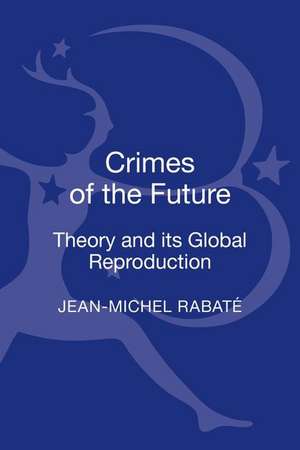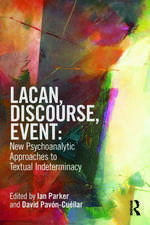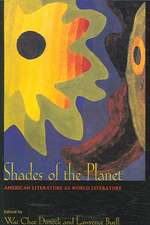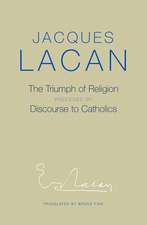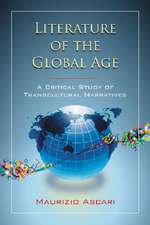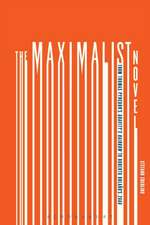Crimes of the Future: Theory and its Global Reproduction
Autor Professor Jean-Michel Rabatéen Limba Engleză Hardback – 18 iun 2014
| Toate formatele și edițiile | Preț | Express |
|---|---|---|
| Paperback (1) | 192.73 lei 6-8 săpt. | |
| Bloomsbury Publishing – 18 iun 2014 | 192.73 lei 6-8 săpt. | |
| Hardback (1) | 832.26 lei 6-8 săpt. | |
| Bloomsbury Publishing – 18 iun 2014 | 832.26 lei 6-8 săpt. |
Preț: 832.26 lei
Preț vechi: 1131.78 lei
-26% Nou
Puncte Express: 1248
Preț estimativ în valută:
159.25€ • 166.28$ • 131.50£
159.25€ • 166.28$ • 131.50£
Carte tipărită la comandă
Livrare economică 15-29 aprilie
Preluare comenzi: 021 569.72.76
Specificații
ISBN-13: 9781441146342
ISBN-10: 1441146342
Pagini: 280
Dimensiuni: 138 x 216 x 25 mm
Greutate: 0.52 kg
Ediția:New.
Editura: Bloomsbury Publishing
Colecția Bloomsbury Academic
Locul publicării:New York, United States
ISBN-10: 1441146342
Pagini: 280
Dimensiuni: 138 x 216 x 25 mm
Greutate: 0.52 kg
Ediția:New.
Editura: Bloomsbury Publishing
Colecția Bloomsbury Academic
Locul publicării:New York, United States
Caracteristici
A thorough exploration of the past, present and possible future of theory
Notă biografică
Jean-Michel Rabaté is one of the world's foremost literary theorists. He is Professor of English and Comparative Literature and the Vartan Gregorian Professor in the Humanities at the University of Pennsylvania, USA. Professor Rabaté has authored or edited more than thirty books on modernism, psychoanalysis, contemporary art, philosophy, and writers like Beckett, Pound and Joyce. His publications include The Ghosts of Modernity (2010), The Ethic of the Lie (2008), 1913: The cradle of modernism (2007), and The Future of Theory (2002). He is the Managing Editor of the Journal of Modern Literature. He is a Fellow of the American Academy of Arts and Sciences and is currently the President of the American Samuel Beckett Studies Association.
Cuprins
Introduction: Crimes of the FutureChapter 1. How global should Theory be? Chapter 2. Theory and its lines of flight: Future, Ancient, Fugitive Chapter 3. Investigations of a Kantian dogChapter 4. Divided Truths on Lies: Derrida with Hannah Arendt Chapter 5. Derrida's anterior futures Chapter 6. A Future without death?Chapter 7. The No Future of an IllusionChapter 8. The Styles of Theory: Crimes against fecundityChapter 9: Universalism and its limits: the reasons of the absurdChapter 10. After the "Altermodern"Conclusion: Laughing at the long-lasting joke of the future (Marx and Kafka, Althusser and Antigone).Index
Recenzii
In Crimes of the Future, Jean-Michel Rabaté offers the reader a dazzling series of encounters with thinkers, writers and artists who, since Kant, have fruitfully complicated our sense of the future. Moving with ease across a remarkable range of subjects (in both senses) and several linguistic and philosophical traditions, Rabaté teases out threads that link Mishima and Benjamin, Kafka and Hegel, Althusser and Antigone, and very many more. The result is an exhilarating and illuminating intellectual workout.
In Crimes of the Future Rabaté demonstrates why Theory has a future; a vital one that sets out to answer the question 'how global should Theory be?' Rabaté rethinks a tradition grounded in philosophical and psychoanalytic approaches to theories of the subject for the human sciences today. New materialisms, object relations, technological and digital languages, ethics and bioethics, post-feminism and post-humanism, these are among the rich tendencies and problems foregrounded in this study. The intellectual topography is spot-on. There are few books that provide such a comprehensive and coherent overview of theory between 2001 and 2014 or that experiment with new conjugations so boldly.
Crimes of the Future, Theory and its Global Reproduction does not only concern itself with modernity's obsession with producing a homeless subjectivity, but commensurately, with the face off between the individual and the community, the universal and the particular. It also admits to the thrill that we moderns experience even before our crime - the crime of the destruction of the past - is or was committed. Our expectation in the face of our crime is one with the thrill of the atomic eruption, the bomb blast. It leaves behind only the ironic laughter accompanying the destruction of ancient values that we theorists are not simply helpless to stop but actively engaged in producing as we too seek to participate in the infernal globalized production of ideas.
Jean-Michel Rabaté's Crimes of the Future reunites a number of interconnected essays that address the meaning and significance of theory in today's world. As the critic demonstrates, these are urgent issues. . Counterintuitive as it may sound, theory has actually flourished in its post-theory days. Crimes of the Future demonstrates this explicitly, through the specific argument it builds across its chapters, and implicitly, as a wide-ranging and authoritative theoretical intervention itself. . Replete with remarkably insightful and through-provoking connections, exceptionally learned and timely, Crimes of the Future provides a comprehensive and well-balanced assessment of theory's significance in the present and future global world.
In Crimes of the Future Rabaté demonstrates why Theory has a future; a vital one that sets out to answer the question 'how global should Theory be?' Rabaté rethinks a tradition grounded in philosophical and psychoanalytic approaches to theories of the subject for the human sciences today. New materialisms, object relations, technological and digital languages, ethics and bioethics, post-feminism and post-humanism, these are among the rich tendencies and problems foregrounded in this study. The intellectual topography is spot-on. There are few books that provide such a comprehensive and coherent overview of theory between 2001 and 2014 or that experiment with new conjugations so boldly.
Crimes of the Future, Theory and its Global Reproduction does not only concern itself with modernity's obsession with producing a homeless subjectivity, but commensurately, with the face off between the individual and the community, the universal and the particular. It also admits to the thrill that we moderns experience even before our crime - the crime of the destruction of the past - is or was committed. Our expectation in the face of our crime is one with the thrill of the atomic eruption, the bomb blast. It leaves behind only the ironic laughter accompanying the destruction of ancient values that we theorists are not simply helpless to stop but actively engaged in producing as we too seek to participate in the infernal globalized production of ideas.
Jean-Michel Rabaté's Crimes of the Future reunites a number of interconnected essays that address the meaning and significance of theory in today's world. As the critic demonstrates, these are urgent issues. . Counterintuitive as it may sound, theory has actually flourished in its post-theory days. Crimes of the Future demonstrates this explicitly, through the specific argument it builds across its chapters, and implicitly, as a wide-ranging and authoritative theoretical intervention itself. . Replete with remarkably insightful and through-provoking connections, exceptionally learned and timely, Crimes of the Future provides a comprehensive and well-balanced assessment of theory's significance in the present and future global world.
